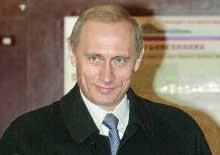 |
|
Vladimir Putin
|
Yesterday's decision by Russian President Vladimir Putin to dismiss his
government -- just three weeks before the presidential election -- took
many politicians and analysts by surprise. Putin says the move reflects
a shift in Kremlin policies. But observers say it is difficult to tell
what impact the change will have on Russia's future.
Prague, 25 February 2004 (RFE/RL) -- No one seems to question why
Vladimir Putin decided to sack his government three weeks before he runs
for
re-election. What they really want to know is -- who will be the next
prime
minister?
Putin, who announced the dismissal yesterday, pledged to inform the
public of his new appointments as soon as possible. "I believe it
right not
to wait until the end of the election campaign, and to announce right
away
the staff of the highest state executive structure that is going to take
on
its share responsibility for the further development of our country,"
he
said.
The Russian president, however, has yet to name either a new prime
minister or outline major goals for the second term he is highly likely
to
win. The president has just two weeks to announce a replacement government.
Moreover, the cabinet may be shuffled yet again after the election, when
the
government must resign according to Russian law.
"It does not matter who heads it. That is why I think that it will
be --- as it was in the past --- the president's government, not the
country's government."
Analysts say the surprise dismissal may have been the natural outcome
of long-standing enmity between Putin and his ousted prime minister, Mikhail
Kasyanov. They also say the move may have been timed to boost public
interest in the 14 March election. The presidential vote needs at least
a 50
percent turnout to be declared valid. Voter apathy may be the only threat
to
Putin's re-election bid.
But Sergei Ivanenko,
one of the leaders of the liberal Yabloko party, says the dismissal raises
many questions beyond mere motive. "The main issue today, in fact,
is not the reasons for the government dismissal. The reasons may be various
-- both substantial and personal," he said. "But the main, really
important question is, What will the new government be like? In that sense,
the president's words raise more questions than answers."
With no official information forthcoming for now, the Russian media
have been busy discussing potential candidates, suggesting Putin is looking
to anoint his political heir. Possibilities include the liberal-leaning
Aledrei Kudrin, the deputy prime minister and finance minister. A more
hard-line option is Defense Minister Sergei Ivanov.
The "Vedomosti" business daily, meanwhile, quoted an unnamed
Kremlin
source as saying the nominee will be a "quite uncommon person"
whose name
has not been mentioned in the media frenzy.
Ivanenko says no matter how "uncommon" the candidate, the
Kremlin's
policy will remain much what it is now -- Putin's policy. "Frankly
speaking,
I hardly believe in Russia's current conditions -- when one party has
a
monopoly in politics, when the mass media is being suppressed, when there
is
no independent judiciary or independent business -- that a relatively
independent government can be imagined," he said. "It does not
matter who
heads it. That is why I think that it will be --- as it was in the past
---
the president's government, not the country's government."
Russian political analyst Andrei Piontkovskii is even more blunt. "The
person who will be appointed will be openly close to the community of
security services -- the so-called siloviki. That will follow the course
that has already been revealed over the past few months -- the replacement
of Yeltsin's generation of oligarchs with the so-called patriotically
oriented people who come from special services," he said.
Russia's near neighbors are watching the changes with interest, if
not
particular concern. Viktor Khristenko, the acting prime minister, is due
to
travel to Kazakhstan tomorrow. Kazakh Prime Minister Danial Akhmetov says
his government does not expect any drastic changes in its relations with
Russia. "Our relations in politics as well as in the economic sphere
will
only expand," he said.
Azimbay Ghali, a Kazakh political analyst, echoes the sentiment,
saying changes in the Russian cabinet will not force a similar government
purge in Astana. "It will not affect us," he said. "We
have our own
political climate. There were few reformers among Kazakh premiers; we
can
mention only [former Prime Minister Akezhan] Kazhegeldin and Akhmetov
as
such. That is why I think Danial Akhmetov's government will not step down
in
the foreseeable future. But surely there will be some changes, a team
shake-up, after the [Kazakh] parliamentary elections [this fall]."
In Tajikistan, Deputy Foreign Minister Salohiddin Nasriddinov said
relations with Russia will be unaffected by the change. "Tajikistan
and
Russia are strategic partners. Bilateral relations with Russia remain
our
priority and despite any changes in the Russian government, our partnership
remains unchanged like before," he said.
|